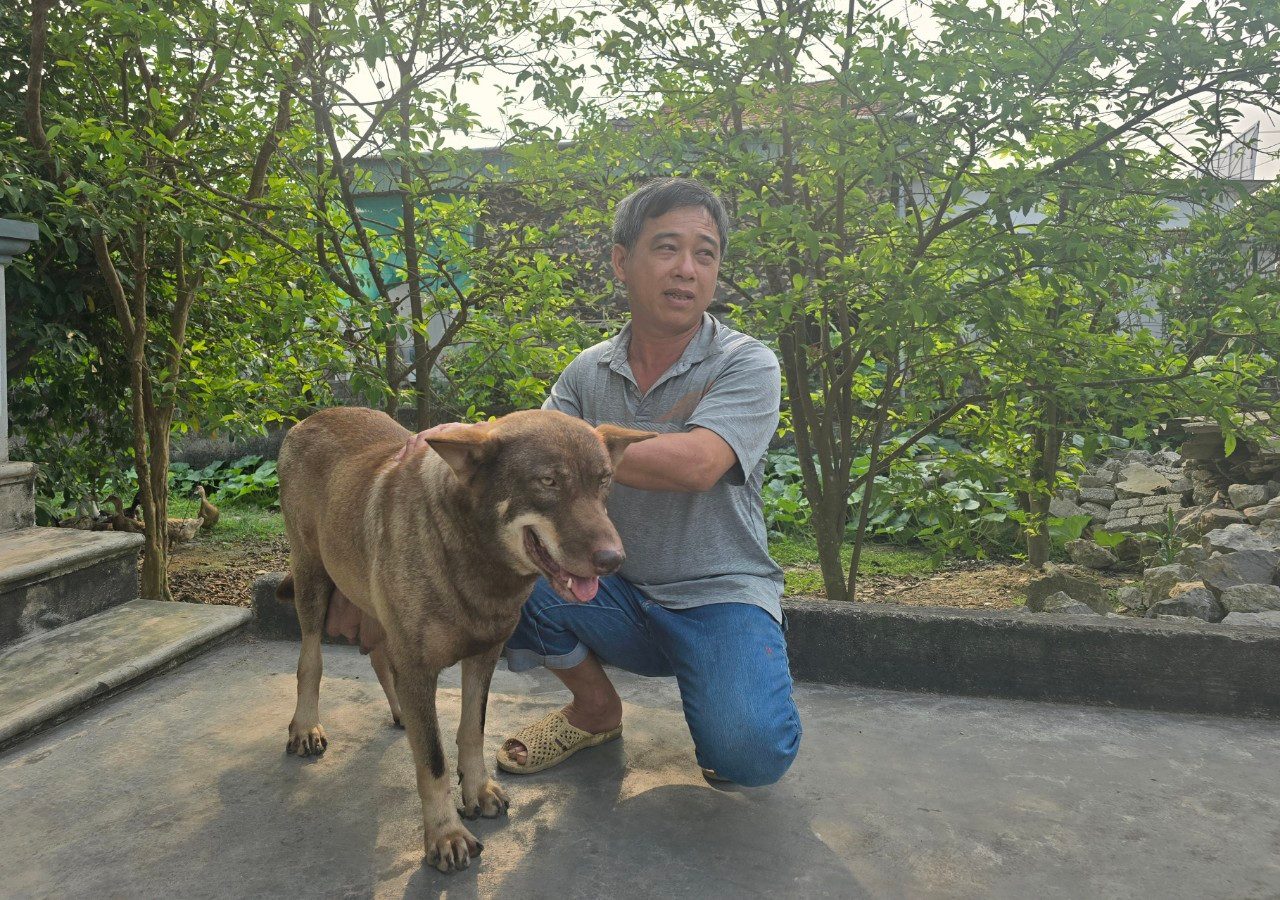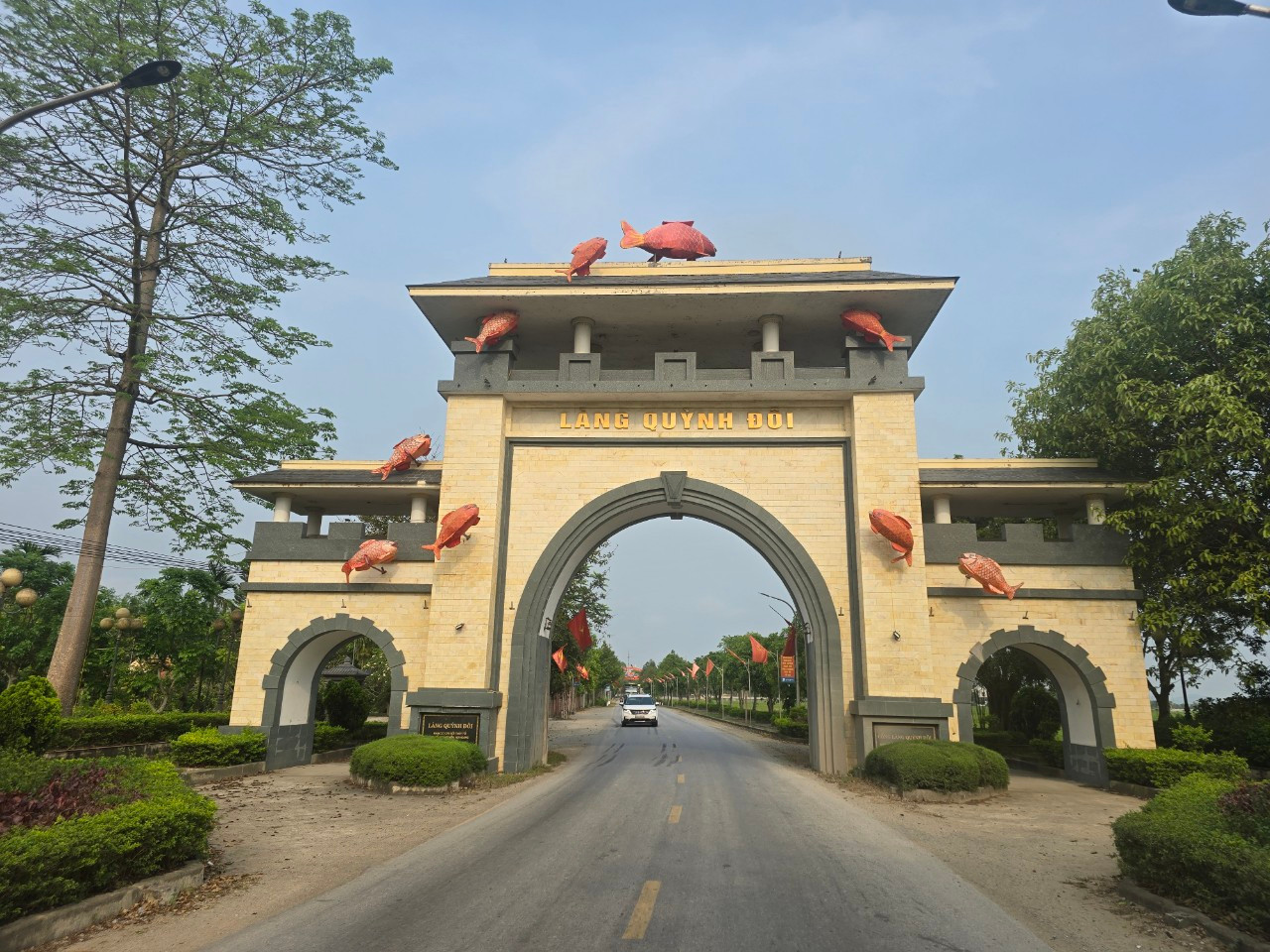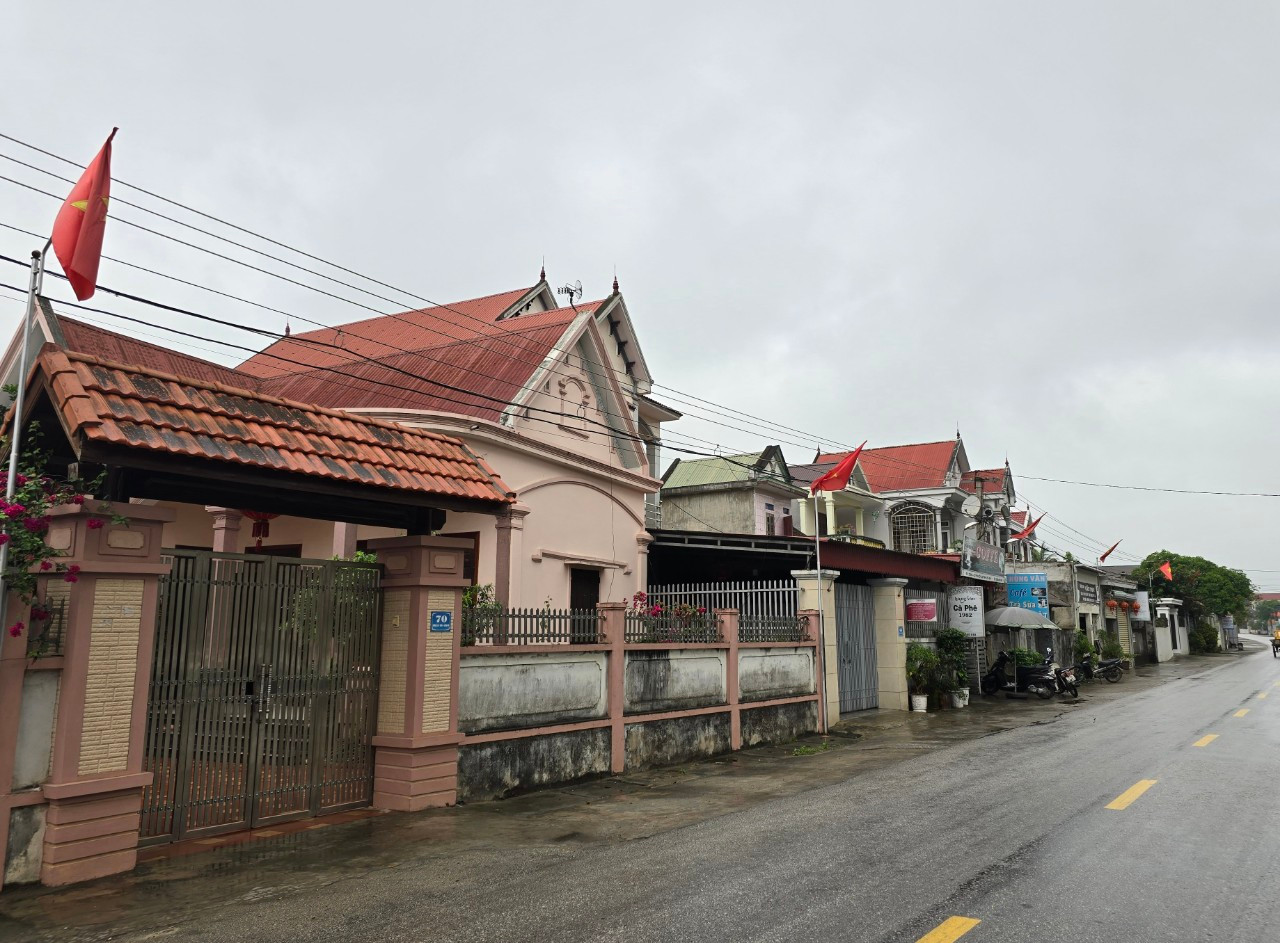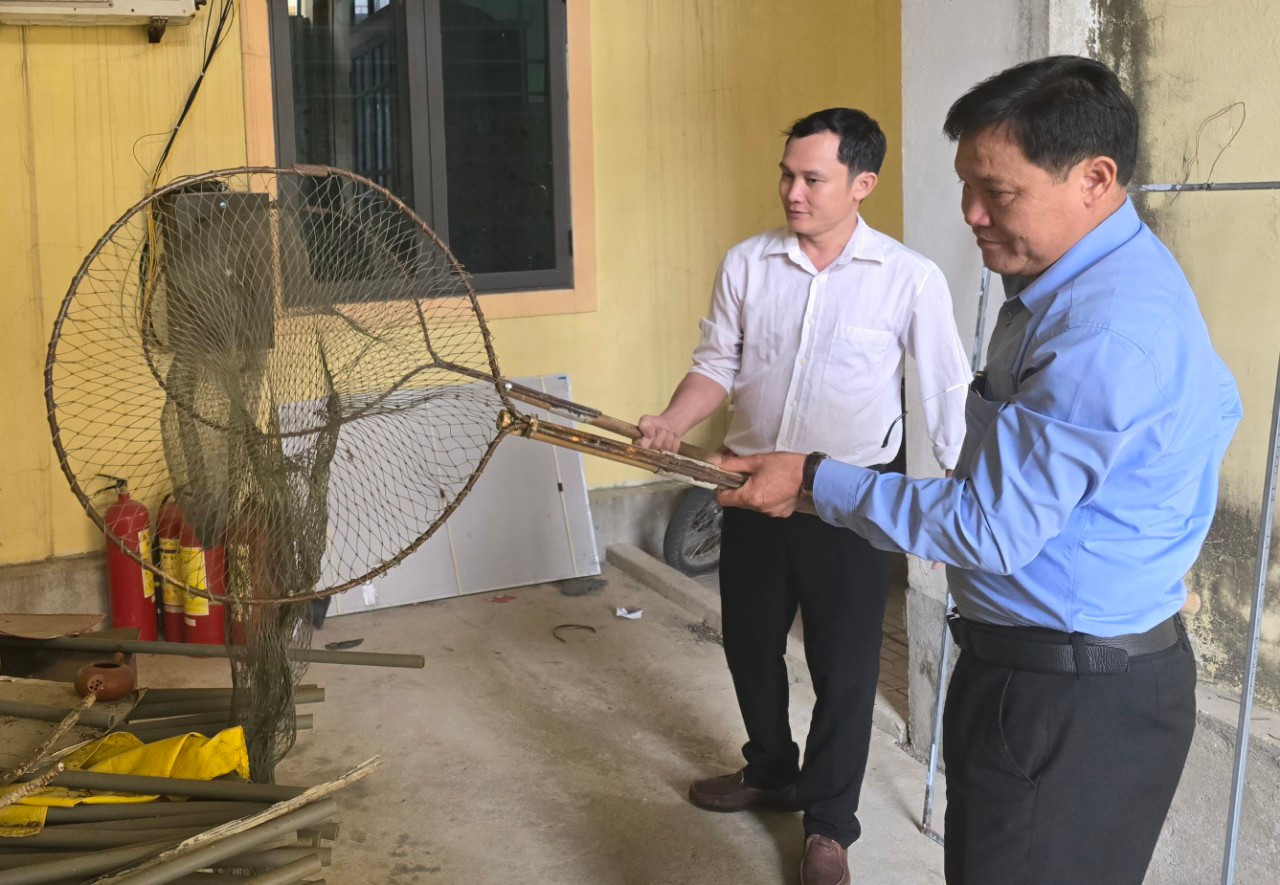Vietnamese
EFFORTS OF THE "VILLAGE OF AWARDS"
For many years now, every time visitors visitQuynh Doi commune(Quynh Luu district), there is a feature that not many people pay attention to, that is, in the clean village streets and alleys, the houses are numbered like in the neighborhoods, there is no longer a shadow of stray dogs. Because there is a regulation there, the homeowner will be severely punished according to the Government's Decree and according to the village's covenant, if the dog steps out of the gate.
Located on the main road into the commune, the iron gate of Mr. Ho Sy Chung's house (51 years old, village 8, Quynh Doi commune) is always locked tightly after each time someone enters or leaves. Mr. Chung strictly enforces this habit to every member of his family, from adults to children. Because Mr. Chung is afraid that the dogs he raises in the house will be let loose on the street and punished by the authorities. "In the past 6 years, although we always raise dogs in the house, we have never let them out. Not to mention being fined or being named on the loudspeaker, we are aware that letting dogs defecate on the street is unsanitary and dangerous for passersby," said Mr. Chung.
Although he is a dog lover, Mr. Chung said that when the village had a regulation to severely punish stray dogs, he fully supported it. Since then, not only has the gate of his house always been closed, Mr. Chung has also trained his dogs not to go outside. "My dog is very smart, and when trained, it obeys immediately. Now, even if the gate is slightly open, it won't run out," Mr. Chung said with a smile.

Talking about the fact that the whole commune no longer has any stray dogs, Mr. Ho Sy Hung - Vice Chairman of the People's Committee of Quynh Doi commune said that to achieve this, it is the effort of the local Party Committee and government in propaganda for a long time. As well as the high awareness of the people of the whole commune.
Mr. Hung said that in 2014, Quynh Doi was one of the first communes in Nghe An to reach the new rural area. Then, the commune, known as the "village of scholars", was also the first locality to reach the new rural area model in Nghe An. After reaching the new rural area, the commune regularly welcomed many delegations of guests as well as children from far away to visit and study the model. "When we visit the commune, we always seek feedback from delegations of guests as well as children from far away. Many people complained about the fact that dogs were roaming freely and defecating, causing unsanitary conditions, while the village roads were very clean and beautiful," Mr. Hung said. Since then, the leaders of Quynh Doi commune began to find solutions to this problem. At that time,There are still no regulations to punish stray dogs.
After receiving the decision from the Commune Party Committee, the Quynh Doi Commune government began to issue regulations banning free-range dogs. “Our commune has more than 1,500 households, but at that time, like other villages, almost every house kept dogs. Although there were regulations banning free-range dogs, we did not rush to deal with it immediately, but had to start propaganda and widespread mobilization among the people. First, the cadres and Party members in the commune had to set an example, then mobilize the people. In the first years, we only reminded each time we discovered free-range dogs, but did not impose any fines,” Mr. Hung said.
It was not until 2018 that the Quynh Doi Commune dog management regulations were officially issued. The commune's regulations detail the responsibilities of dog owners. Specifically, people must register with the village chief to make a list and submit it to the commune people's committee to issue dog management books. The dog management book must clearly state the date of birth, breed, gender, date the family adopted the dog, and the time of vaccination.
Dog owners must strictly comply with the regulations on regular and supplementary rabies vaccinations of veterinary agencies, and must carefully preserve the vaccination papers. In particular, dogs must be leashed, kept indoors, and not let loose on the roads or in residential areas. When taking dogs out in public, they must be leashed and muzzled. Do not let dogs wander on the streets, causing unsanitary conditions and causing accidents for traffic participants. When detecting dogs with unusual symptoms such as: not eating, high fever, unusual aggression, immediately notify the commune veterinary staff or village chief. Newly adopted dogs must be reported to the local veterinary agency for inspection, disease monitoring and rabies vaccination according to regulations.
People must also sign a commitment to: "5 no's". That is, do not raise dogs without rabies vaccination; Do not raise free-ranging dogs; Do not raise dogs that pollute the environment; Do not let dogs bite people; Do not raise dogs without declaring to local authorities.
The regulation also states that dog owners must take full responsibility for letting their dogs run free to pollute the public environment. They must compensate for health, mental and material damages caused by their pets to the direct victims and the community. They must confine the dog that bit a person for at least 14 days. During this time, if the dog shows any unusual signs, they must promptly notify the nearest veterinary station for treatment. All travel expenses, rabies vaccinations and other reasonable expenses incurred by the dog owner are responsible for discussing and agreeing on the level of compensation for damages with the victim or that person's family...

Fines for letting dogs roam free
After the regulation was issued and widely publicized, Quynh Doi commune established two patrol teams, including police and commune officials, to catch stray dogs. Members of this team went to check on village roads, and when they discovered stray dogs, they used dog catchers to bring them to the commune police headquarters for handling. "These teams are equipped with dog catchers, and usually patrol early in the morning and late in the afternoon, because at that time dogs defecate a lot on the streets," said the Vice Chairman of Quynh Doi Commune People's Committee.
At that time, there were days when patrol teams caught dozens of dogs. After bringing them to the headquarters, the commune authorities would announce on the loudspeaker the characteristics, time, and location of each dog so that people would know. If the owner did not come to claim the dog within 24 hours of the announcement, the dog would be destroyed. The fine for each time a dog was released without a muzzle was 700,000 VND (applied according to Decree 90/2017) and then increased to 1,500,000 VND (applied according to Decree 04/2020). All fines were put into the budget.
"Because in the village, it is inevitable that the patrol team has a close relationship with the violators, so we have a clear rule with no exceptions. In the beginning, many dogs were captured. There were some small dogs, the value of which was not equal to the fine, so many people did not come to pay the fine to take the dogs back. In those cases, we set up a public and clear destruction team. The procedures were strict to avoid complaints," said the Vice Chairman of the People's Committee of Quynh Doi commune.

At first, the working groups had to use rackets to patrol and catch dogs every day. However, in the past few years, Quynh Doi commune has applied a different regulation. That is, fines are imposed through cameras. Especially since 2020, houses in the commune have been assigned specific house numbers. Security cameras in the commune as well as in households are also installed densely.
“We regularly extract images from cameras, and at the same time, we encourage all people on the street to film and take pictures if they discover a stray dog and send them to the commune for handling. Along with that, patrols are still maintained but reduced. And each time we patrol, we no longer need to carry a racket. The person sitting behind the motorbike will have the task of holding a phone to film, and if they discover a dog on the street, they will chase and film to see which house the dog returns to. Because the house number is clear, we will then send a notice to the homeowner to come in and issue a fine,” said a police officer from Quynh Doi commune who is part of the patrol team.
Not only are violators fined, they are also “named and shamed” on the commune loudspeaker. Therefore, the regulation prohibiting dogs from roaming freely is strictly followed by the people. According to statistics from Quynh Doi Commune Police, in the past 6 months, the whole commune has only had 4 cases of fines for letting dogs roam freely.
Thanks to good management of dogs, the number of families raising dogs in Quynh Doi commune has decreased significantly. There are no more stray dogs, the village roads are clean, people feel safer because they are no longer afraid of being attacked by dogs, especially dogs with rabies. According to the leaders of Quynh Doi commune, in recent years, many localities have come to learn and implement this regulation banning stray dogs, but because it was implemented hastily, it only lasted a short time, and they were helpless because there were still too many stray dogs.

Also in Nghe An, Dien Nguyen commune (Dien Chau district) has long been famous for banning dog breeding. According to the commune leader, about 60 years ago, there was a rabies epidemic in the locality, many people were bitten by dogs and later died. In addition, at that time, most of the people in the commune used water from the village well, which was built low, causing dogs to defecate frequently, causing unsanitary conditions. Since then, this locality has had a village covenant banning dog breeding.
To legalize the village covenant, a few years ago, the leaders of Dien Nguyen commune included the regulation prohibiting dog keeping in the Resolution and issued a document. "After that, the district inspected and found that the document was not in accordance with the law, so it had to be canceled. Since then, many people have started raising dogs again. That's why, in the past, based on the village covenant, no one in the commune kept dogs. But when it was included in the document, it was no longer banned," said Mr. Dam Van Chinh - Chairman of the People's Committee of Dien Nguyen commune.
According to Mr. Chinh, since the Government issued a Decree on punishing stray dogs, the commune has also set up patrol teams and bought rackets to catch dogs. However, after a short time, the authorities were helpless because they could not catch enough dogs and "affected relationships in the countryside".